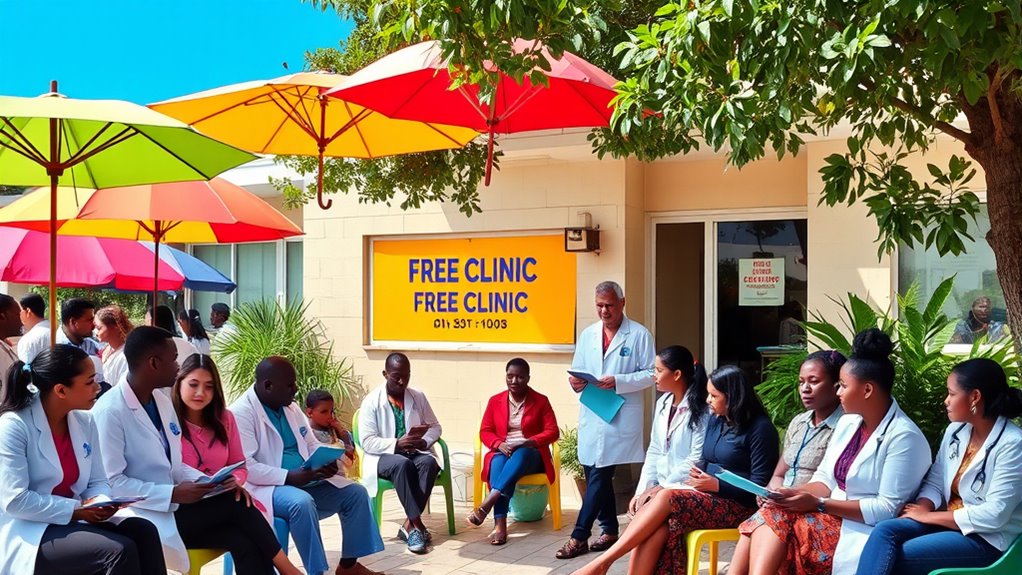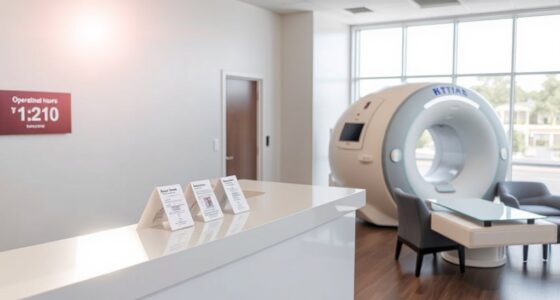Free clinics offer low-cost healthcare during limited hours, often about 18 hours a week, with many focusing on daytime services. Long wait times for appointments and scarce evening or weekend options mean you might face delays getting care. Staffing mostly relies on volunteers, which keeps costs down but can also reduce hours and availability. To learn how you can navigate these constraints and access care when needed, keep exploring the options available to you.
Key Takeaways
- Most free clinics offer limited hours, averaging around 18 hours per week, which may cause long wait times for care.
- Many clinics provide walk-in options and some evening appointments to improve access.
- Funding and staffing shortages, mainly reliant on volunteers, restrict clinic hours and service expansion.
- Limited operational hours and resources can delay treatment, leading to worsened health outcomes.
- Stable funding and volunteer support are essential for clinics to increase hours and meet rising healthcare demands.

Have you ever wondered how much free clinics are really open to serve those in need? The truth is, their operating hours are quite limited, averaging around 18 hours per week, but this varies widely—from as few as 5 hours to over 40. Most clinics focus on daytime hours, though many offer evening appointments to accommodate working individuals. Still, with such restricted hours, long wait times are common. Patients often wait 11 to 12 days for scheduled appointments, and walk-in options are available at about 71% of clinics, but high demand still creates bottlenecks. This limited availability stems partly from funding constraints and staffing challenges, which directly impact how much service these clinics can provide. Funding limitations also restrict the ability of clinics to expand their hours or increase staffing levels, further impacting patient access. Volunteer recruitment plays a vital role in keeping these clinics operational. Since approximately 92% of the staff are volunteers, clinics depend heavily on community members stepping up to provide their time and skills. This reliance on volunteers helps reduce operational costs but also introduces variability. When volunteer availability drops, clinics might shorten their hours or reduce services, making it harder for patients to access timely care. On the flip side, a strong volunteer base allows clinics to stretch their limited funding further, increasing their capacity to serve more people within their constrained budgets. Funding sustainability remains the biggest challenge facing free clinics. Many operate with budgets around $287,810, and more than half receive little to no government funding. Most rent their facilities, which adds ongoing expenses that eat into their budgets. Funding issues restrict not only the number of hours clinics can be open but also their ability to expand services, especially as demand continues to grow. As Medicaid cuts and other funding limitations persist, clinics might be forced to cut back hours further or even close, leaving vulnerable populations with fewer options for low-cost healthcare. This situation underscores the importance of stable funding sources and effective volunteer recruitment to keep clinics running and accessible. Service availability and scheduling are designed to maximize access but are still limited by operational hours. Many clinics offer both scheduled appointments and walk-ins, screening patients based on income, insurance status, or residency to manage demand. Night and weekend hours are rare, which means many patients still face long waits for care. When hours are restricted, delays in treatment can lead to worsening health conditions, especially for chronic illnesses or mental health needs—services that are increasingly in demand. Longer, more adaptable clinic hours correlate with better patient outcomes, reducing emergency visits and improving preventive care. Yet, the ongoing struggle to maintain funding and recruit enough volunteers hampers clinics’ ability to meet rising health demands, particularly for mental health services. Without sustained effort in volunteer recruitment and funding, these clinics risk further limitations, leaving the most vulnerable with fewer options for essential, low-cost healthcare.
Frequently Asked Questions
How Can I Find Free Clinics Near My Location?
To find free clinics near you, start with online resources like the NAFC Clinic Locator or search local government websites. Use keywords like “free clinics with transportation assistance” or “mental health support” to narrow your options. You can also ask friends or community organizations for recommendations. Many clinics offer walk-in services and mental health programs, helping you access care without worries about transportation or costs.
Are Appointments Necessary for Free Clinic Visits?
While some might assume appointments are mandatory, many free clinics adopt flexible walk-in policies to accommodate urgent needs and unpredictable schedules. Appointment scheduling can provide shorter wait times and more personalized care, but walk-ins guarantee immediate access for those in crisis. Your choice depends on the clinic’s policies; some require appointments, while others prioritize walk-in visits, balancing convenience with resource limitations.
What Services Are Typically Offered During Free Clinic Hours?
During free clinic hours, you typically receive a range of services like primary care, pharmacy access, and dental care. Community outreach and health education are also common, helping you prevent future health issues. Many clinics focus on chronic disease management and patient engagement, ensuring you get extensive care. These services aim to improve your overall health while reducing emergency room visits, making healthcare more accessible and effective for uninsured and underinsured individuals.
Can I Access Specialist Care at Free Clinics?
You might think free clinics always offer specialist care, but they often rely on specialist referrals for advanced treatments due to limited resources. While some clinics do provide direct access to specialists, many coordinate referrals to local providers. The scope of specialist services varies, so your access depends on the clinic’s partnerships and funding. Despite some limitations, patients value these referrals highly, as they often get essential, specialized care they couldn’t otherwise afford.
Are There Age Restrictions for Free Clinic Services?
You might wonder about age limits and eligibility requirements for free clinic services. Generally, there aren’t universal age restrictions, but clinics tailor their services based on community needs. Children and seniors usually have alternative coverage options like Medicaid or Medicare, so free clinics focus mainly on low-income, uninsured adults aged 18-64. Some clinics provide confidential care for minors, and eligibility varies by clinic, so it’s best to check their specific policies.
Conclusion
Remember, free clinic hours are like a welcoming lighthouse shining through foggy nights—guiding you safely toward affordable care when you need it most. Don’t hesitate to step into this beacon of hope, where your health is nurtured without sinking into debt. With these hours, you hold a powerful brush to paint a healthier, brighter future. So, seize the moment and let this opportunity be your steady compass on the journey to wellness.










